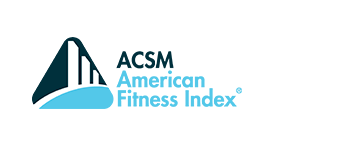
Half of metro areas saw scores improve
Indianapolis (May 16) – The twin cities of Minneapolis-St. Paul edged Washington, D.C. in the 10th annual American Fitness Index (Fitness Index) rankings released by the American College of Sports Medicine (ACSM) and the Anthem Foundation, the philanthropic arm of Anthem, Inc. The nation’s capital held the top spot for the past three years and improved its score in 2017, but Minneapolis-St. Paul still finished on top despite the challenges of being a northern state with hard winters. (Link – View the rankings and individual metro data here or at the chart below.)
San Francisco-Oakland finished third this year, Seattle-Tacoma fourth, San Jose fifth, Boston sixth and Denver seventh. The top seven cities in the 2017 Fitness Index are between 4-13 percentage points ahead of the rest of the pack, principally related to lower rates of smoking and cardiovascular disease deaths and higher reported physical activity, consumption of fruits and vegetables, and per capita park expenditures in their communities.
Nationally, there were some remarkable positive shifts during the last year:
- 16.0% increase in the percent who met the recommendations for aerobic and strength in the last 30 days
- 10.5% drop in the percent with diagnosed angina or coronary heart disease
- 3.9% increase in walkability scores
- 3.9% increase in the percent who live within a 10-minute walk to a park
- 3.7% increase in the total park expenditures per capita
- 4.0% increase in the number of recreation centers per 20,000 residents
Metropolitan Statistical Areas (MSA) with the greatest improvement in their rankings since last year included San Jose, Los Angeles, Miami, Buffalo, Orlando and Las Vegas.
The 2017 Fitness Index rankings also revealed some shortcomings over the past year:
- 11.7% increase in the rate of diabetes deaths
- 6.3% reduction in the percent of residents biking or walking to work
- 6.2% decrease in the percent of individuals eating the recommended number of servings of fruit
- 4.6% reduction in the number of tennis courts per 10,000 residents
MSAs experiencing the largest drop in their rankings this year included Virginia Beach, Richmond, Providence, Philadelphia, Kansas City, New Orleans and Charlotte.
Against the backdrop of its 10th anniversary, the Fitness Index offers some insightful long-term trends:
-
- Smoking rates have declined (18.7% to 16.7%)
- Drops in the death rates for diabetes (24.0/100,000 to 18.7/100,000) and cardiovascular diseases (223.0/100,000 to 174.6/100,000)
- The number of farmers’ markets have increased (11.0/1,000,000 to 19.8/1,000,000)
- Increases in the percent of residents using public transportation to work doubled (2.1% to 4.4%)
- Residents biking or walking to work doubled (1.3% to 2.9%)
- Total park expenditures per capita increased ($100 to $106)
Conversely, the 10-year comparison of Fitness Index indicators uncovered some challenges:
-
- The percent categorized as obese increased (25.4% to 28.7%)
- The percent self-reporting as having excellent or very good health declined (55.6% to 52.1%)
- The percent diagnosed with asthma increased (8.2% to 9.0%), as did the percent with diabetes (8.0% to 10.7%)
The ACSM American Fitness Index provides evidence-based data and a number of valuable resources that help cities promote healthy lifestyles. To aid communities in promoting physical activity and enhancing quality of life, ACSM and Anthem Foundation developed and released the Community Action Guide offering an overview of the critical decisions and factors related to effective community action: https://americanfitnessindex.org/community-action-guide/
“Our ultimate goal is to offer individuals, families and communities trusted resources that can help them assess, plan and implement policies that promote positive health outcomes,” said Walter R. Thompson, Ph.D., FASCM, who chairs the Fitness Index Advisory Board and is president-elect of ACSM. “Ten years of evidence-based data offers these cities and their citizens valuable insights into how to substantively improve elements leading to healthier lives and reduced health care costs.”
“As the American Fit Index celebrates its 10th year, it’s a great opportunity to celebrate the efforts of communities and their leaders who have effectively used the data to make measurable changes that are helping improve the health and wellness of their residents,” said Craig Samitt, MD, chief clinical officer, Anthem, Inc. “While the improvements we are seeing are worth celebrating, we know there is still more that can be done. We are proud of our foundation’s work and collaboration with ACSM to offer science and evidence for communities to create a culture of healthy lifestyles.”
At the community level, the Fitness Index has been used as an assessment and evaluation tool to educate community leaders on the importance of key indicators of physical activity. Leaders can then focus on policy, systems and environmental change strategies that are evidence-based and create sustainability for the community.
The 2017 ACSM American Fitness Index rankings are as follows:
| 2017 Rank |
2016 Rank |
Metropolitan Area |
2017 Score |
| 1 |
2 |
Minneapolis-St. Paul-Bloomington, MN-WI |
80.2 |
| 2 |
1 |
Washington-Arlington-Alexandria, DC-VA-MD-WV |
79.2 |
| 3 |
5 |
San Francisco-Oakland-Hayward, CA |
73.3 |
| 4 |
6 |
Seattle-Tacoma-Bellevue, WA |
72.2 |
| 5 |
11 |
San Jose-Sunnyvale-Santa Clara, CA |
71.6 |
| 6 |
7 |
Boston-Cambridge-Newton, MA-NH |
71.5* |
| 7 |
3 |
Denver-Aurora-Lakewood, CO |
71.5* |
| 8 |
4 |
Portland-Vancouver-Hillsboro, OR-WA |
67.7 |
| 9 |
8 |
Salt Lake City, UT |
66.3 |
| 10 |
10 |
San Diego-Carlsbad, CA |
65.6 |
| 11 |
13 |
Sacramento–Roseville–Arden-Arcade, CA |
63.3 |
| 12 |
15.5± |
Austin-Round Rock, TX |
61.2 |
| 13 |
9 |
Hartford-West Hartford-East Hartford, CT |
60.5 |
| 14 |
15.5± |
Raleigh, NC |
58.6 |
| 15 |
12 |
Chicago-Naperville-Elgin, IL-IN-WI |
58.4 |
| 16 |
29 |
Los Angeles-Long Beach-Anaheim, CA |
55.7 |
| 17 |
14 |
Atlanta-Sandy Springs-Roswell, GA |
55.0 |
| 18 |
22 |
New York-Newark-Jersey City, NY-NJ-PA |
54.5 |
| 19 |
26 |
Tampa-St. Petersburg-Clearwater, FL |
54.1 |
| 20 |
17 |
Baltimore-Columbia-Towson, MD |
54.0 |
| 21 |
20 |
Milwaukee-Waukesha-West Allis, WI |
53.9* |
| 22 |
23 |
Cincinnati, OH-KY-IN |
53.9* |
| 23 |
32 |
Miami-Fort Lauderdale-West Palm Beach, FL |
52.6 |
| 24 |
35 |
Buffalo-Cheektowaga-Niagara Falls, NY |
52.5 |
| 25 |
43 |
Orlando-Kissimmee-Sanford, FL |
52.3 |
| 26 |
28 |
Saint Louis, MO-IL |
51.6 |
| 27 |
19 |
Virginia Beach-Norfolk-Newport News, VA-NC |
50.7 |
| 28 |
25 |
Cleveland-Elyria, OH |
50.0 |
| 29 |
27 |
Pittsburgh, PA |
49.0 |
| 30 |
18 |
Richmond, VA |
48.9 |
| 31 |
21 |
Providence-Warwick, RI-MA |
48.4* |
| 32 |
24 |
Philadelphia-Camden-Wilmington, PA-NJ-DE-MD |
48.4* |
| 33 |
34 |
Phoenix-Mesa-Scottsdale, AZ |
47.3* |
| 34 |
41 |
Las Vegas-Henderson-Paradise, NV |
47.3* |
| 35 |
31 |
Jacksonville, FL |
46.0 |
| 36 |
30 |
Kansas City, MO-KS |
45.0 |
| 37 |
36 |
Riverside-San Bernardino-Ontario, CA |
44.5 |
| 38 |
37 |
Dallas-Fort Worth-Arlington, TX |
43.2 |
| 39 |
33 |
New Orleans-Metairie, LA |
41.7 |
| 40 |
40 |
Houston-The Woodlands-Sugar Land, TX |
39.0 |
| 41 |
38 |
Columbus, OH |
37.4 |
| 42 |
46 |
Nashville-Davidson–Murfreesboro–Franklin, TN |
36.8 |
| 43 |
42 |
Detroit-Warren-Dearborn, MI |
35.8 |
| 44 |
45 |
San Antonio-New Braunfels, TX |
34.7 |
| 45 |
47 |
Memphis, TN-MS-AR |
33.2 |
| 46 |
44 |
Birmingham-Hoover, AL |
31.2 |
| 47 |
39 |
Charlotte-Concord-Gastonia, NC-SC |
30.3 |
| 48 |
50 |
Indianapolis-Carmel-Anderson, IN |
29.9 |
| 49 |
49 |
Oklahoma City, OK |
29.4 |
| 50 |
48 |
Louisville/Jefferson County, KY-IN |
23.1 |
±There was a tie in the ranking between the MSAs.
*The scores shown have been rounded to the nearest tenth of a point resulting in some apparent ties; however, the rankings are based on the full calculated score values that were not equal in those cases.
Methodology
ACSM, the Indiana University School of Family Medicine and a panel of 26 health and physical activity experts developed the methodology to analyze U.S. Census data; data from the U.S. Centers for Disease Control and Prevention’s Behavioral Risk Factor Surveillance System (BRFSS); The Trust for the Public Land City Park Facts; and other existing research data in order to give a scientific, accurate snapshot of the health and fitness status at a metropolitan level.
ACSM is a global leader in promoting the benefits of physical activity and advocates for legislation that helps government and the health community make it a priority. ACSM encourages Congress to support continued funding of parks, trails and safe routes to school, as well as the need for all Americans to meet the prescribed physical activity recommendations included in the National Physical Activity Guidelines, and the need for the guidelines to be regularly updated every 10 years.
The data is made up of personal health, community and environmental indicators. Visit the online newsroom at www.AmericanFitnessIndex.org for a complete list of the data components.
About the American College of Sports Medicine
The American College of Sports Medicine is the largest sports medicine and exercise science organization in the world. More than 50,000 international, national and regional members are dedicated to advancing and integrating scientific research to provide educational and practical applications of exercise science and sports medicine. More details can be found at http://www.acsm.org/
About Anthem Foundation
The Anthem Foundation is the philanthropic arm of Anthem, Inc. and through charitable contributions and programs, the Foundation promotes the inherent commitment of Anthem, Inc. to enhance the health and well-being of individuals and families in communities that Anthem, Inc. and its affiliated health plans serve. The Foundation focuses its funding on strategic initiatives that address and provide innovative solutions to health care challenges, as well as promoting the Healthy Generations Program, a multi-generational initiative that targets specific disease states and medical conditions. These disease states and medical conditions include: prenatal care in the first trimester, low birth weight babies, cardiac morbidity rates, long term activities that decrease obesity and increase physical activity, diabetes prevalence in adult populations, adult pneumococcal and influenza vaccinations and smoking cessation. The Foundation also coordinates the company’s year-round Associate Giving program which provides a 50 percent match of associates’ pledges, as well as its Volunteer Time Off and Dollars for Doers community service programs. To learn more about the Anthem Foundation, please visit http://www.anthem.foundation and its blog at http://anthemfoundation.tumblr.com.




